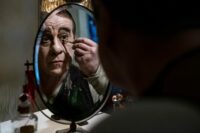If any director has earned the right to his own story, it’s Steven Spielberg. Quite easily, The Fabelmans could have fallen into the trappings of a self-serving ego piece, but over his career Spielberg typically avoids beating to the rhythm of his own drum (except for 1941). The Fabelmans is delicate, affectionate, and bold. Spielberg’s tenderness for his characters is what makes his work universally praised. Is Spielberg’s The Fabelmans a new classic? No, but it’s still a very good movie that shouldn’t go unrecognized.
By not calling his movie “The Spielbergs” but rather The Fabelmans, Spielberg makes it clear that his movie is a fable, not to be taken entirely as fact. What could be interpreted as truth or fiction is entirely up to the audience. It doesn’t matter what’s really happened in young Steven’s life. What’s important is how the movie makes us feel. By adding fiction to reality, Spielberg draws us into a character’s psyche.
The Fabelmans At The Movies
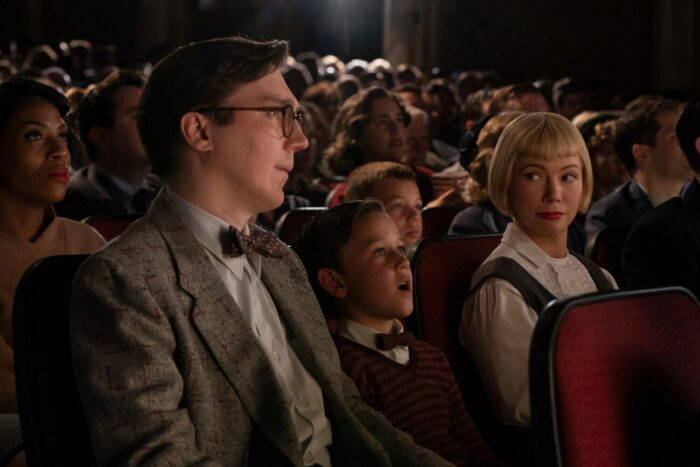
Sammy Fabelman’s destiny is set after viewing his first theatrical film. Young Sammy (Mateo Zoryon Francis-DeFord) is afraid of entering a dark movie theater while waiting in line to enter the cinema. His parents reassure the youngster there’s nothing to fear. Cut to Sammy witnessing a horrific train crash projected on the big screen. At the time, Cecil B. DeMille’s The Greatest Show on Earth seemed like a perfectly safe movie to bring a child to. The eventual Best Picture winner from that year is about a traveling circus made for laughs and fun. A horrific death wasn’t expected. With humorous irony, Burt Fabelman (Paul Dano) purchases a table-sized train set for his son to play with the next day.
Being an engineer, Burt is fascinated by motion. Before entering the movie theater, Burt explains the process of the moving image to his son. The train, like a motion picture, draws a connection to ingenuity. The locomotive requires an engine to run and needs tracks to avoid collisions. The projector, like a train engine, runs on a track powered by a motor. The film moves rapidly through a flickering light projecting each frame, tricking the audience into thinking they’re watching something move. If the film falls off the track, the print could be destroyed.
A Filmmaker Is Born
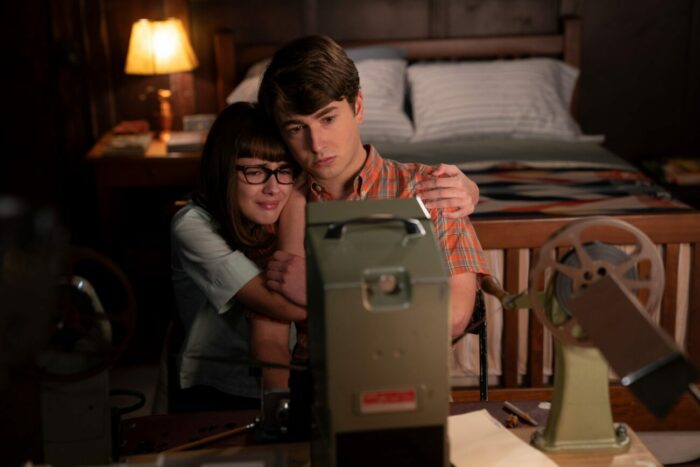
Instead of running from what scares him, Sammy heads towards it with profound curiosity. Watching the toy train run smoothly is boring. Sammy wants it to collide. When telling his mother, Mitzi, about his fantasy, mom introduces her son to the camera. By filming the train crash on a little 8mm camera, Sammy can watch the destruction as many times as he wants without constantly wreaking dad’s nice toy. Glimpses of Spielberg’s natural talent are prevalent through the home video. The lights from the train unleash an intimidating flare while the camera whip pans to the wooden doll trapped in the car, awaiting its demise.
Through the parents, we can see how Spielberg went on to become the filmmaker he is today. Speilberg bears his soul through a fictionalized version of his mother for the entire world to see. Mitzi Fabelman is not mentally stable. Her dreams of becoming a great concert pianist never came to fruition, possibly due to her episodic behavior challenges. Whatever diagnosis Mitzi may have is never sought.
Mother’s Heart
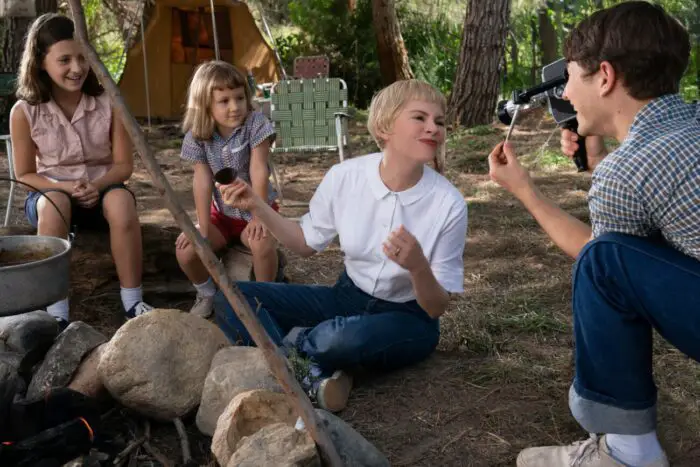
Playing the role of Mitzi is Michelle Williams, who pulls off an Oscar-caliber portrayal. The balance between psychotic and loving expressions is delicately woven through Williams’ dazzling performance. Williams could have played Mitzi in a manic style. Instead of going for big emotions, Williams adds kindness to her character, not letting her impairments define her.
As aforementioned, to calm herself, Mitzi plays the piano. Mitzi’s sonatas serve as the spine of the film’s score. Transforming Mitzi’s music into the film’s soundtrack is none other than John Williams. As a ninety-year-old man, John has come to the end of his career. His final score will be for next year’s fifth Indiana Jones film. The Fabelmans is John Williams’ farewell to an old friend.
The sonatas carry a harmonious “thank you for all the years together.” Similar in his score to Schindler’s List, Williams doesn’t use the usual large orchestrations to symphonically tell the story. With fewer instruments, something more intimate is composed that goes beyond his larger works.
The Fabelmans theme has an innocent yearning for a past that only exists in one’s mind. Nostalgia can make us forget how imperfect the past was. For all its joy, the past can be painful, complicated, and a drug that’s difficult to escape from. Tied between art and family, Sammy knows he’ll have to cut one from his life. Midway through the film, we follow the path of Sammy as a teenager, played by newcomer Gabriel LaBelle, who bears a subtle resemblance to Steven Spielberg. It’s not a mirror image, but close enough that the audience can see the affectionate approach.
All in the Family
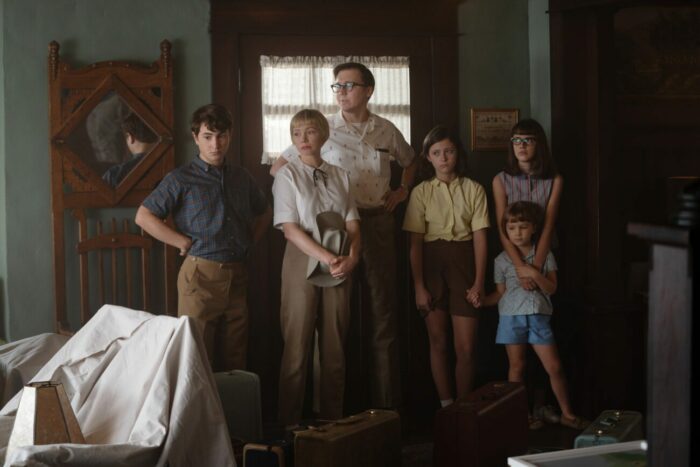
All across the board, the cast shines. LaBelle is a compelling young man who doesn’t fake his emotions. Paul Dano’s nerdy demeanor works in his favor as the tech genius dad, and even Seth Rogan shines as a supportive character who contains one of the film’s most painful scenes.
To complete the cast is the honorable Judd Hirsch, who makes a grand appearance as Uncle Boris, a man whose lifelong endeavor as an artist rose little higher than that of a penniless circus performer. He’s the danger that exists in pursuing art. One cannot live with both art and family. A path must be chosen. Boris is a reminder of what happens when one doesn’t succeed when pursuing your dreams. An artist can be damned to live on scraps instead of having a nice house equal to Burt Fabelman’s own.
High School Drama
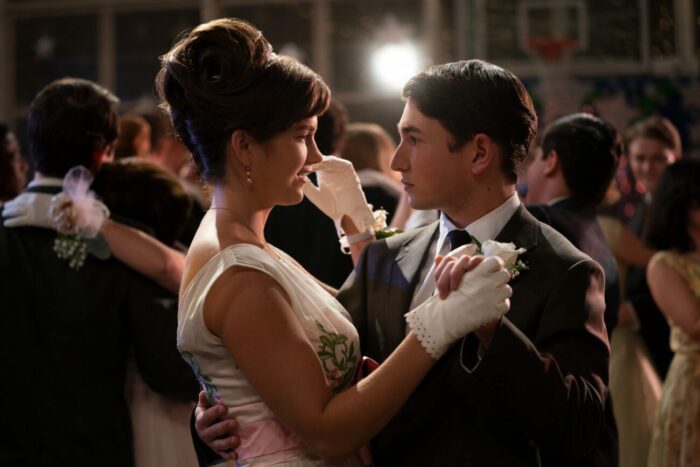
The Fabelmans’ structure stumbles during the middle act. The family’s narrative is more compelling than the high school drama. As a high schooler in the 1960s, Sammy becomes a victim of anti-Semitism. Where the first half of the film plays as an unpredictable, well-constructed collection of memories, the high school portion gets bogged down in familiarity. Luckily, there is a degree of that signature Spielberg visual touch from cinematographer Janusz Kaminski and Williams’s music that sets Steven’s films on the top of Hollywood’s hills.
Near the film’s end, Sammy’s bully Logan Hall (Sam Rechner), has a big weepy confrontation with Sammy that may have happened in real life but did not seem believable in the context of the film. Still, I credit Spielberg for not making Logan a cardboard cutout bully. Steven Spielberg has a unique heart that few other filmmakers have. He never wastes a role or disposes of characters carelessly.
A Filmmaker Is Born
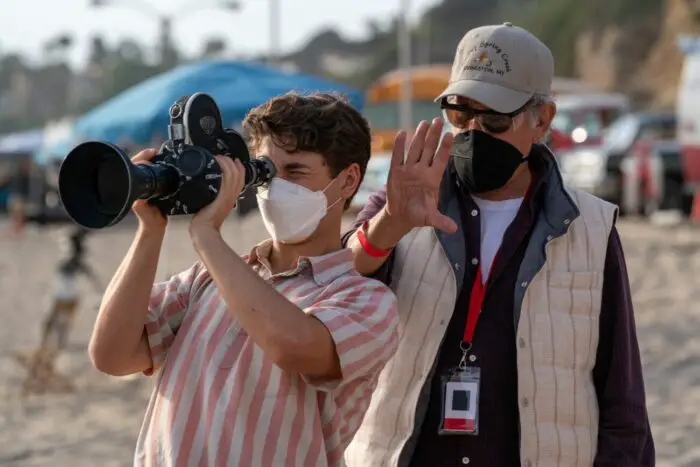
No character is overtly judged in a Spielberg picture (unless it’s a Nazi). The Fabelmans is a love letter to Steven’s family that is elegant and honest to its recipients. Spielberg did not need to compile his life story for the world to see. Yet he presents this film with a measure of genuine sentiment that few other filmmakers can achieve.
Although Mitzi is unstable, she’s not harmful to anyone or herself. She’ll do anything to keep her children happy, perhaps more so than Burt. Dano’s father remains a perfectly likable person, who’s also a good father and husband. Burt isn’t afraid to move or leave his family if an opportunity arises.
Despite their faults, Mr. and Mrs. Fabelman are incredible parents that Sammy cannot live with forever. For his dreams rest in the stars orbiting Los Angeles. There’s a beauty in The Fabelmans that cuts deeper than the tropes of crazy moms, selfish dads, or bigoted bullies. In a roundabout way, The Fabelmans is Steven Spielberg’s homage to Cinema Paradiso—an honorable, therapeutic picture of an artist whose legacy continues to burn bright.



